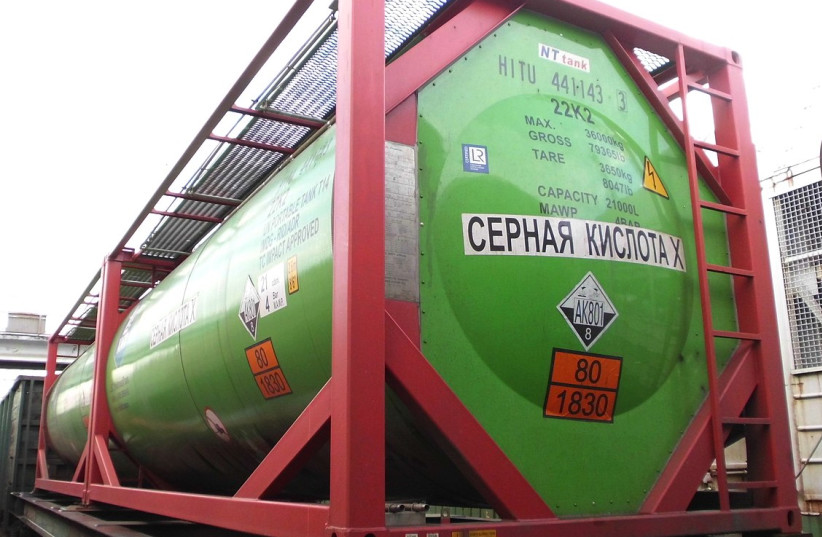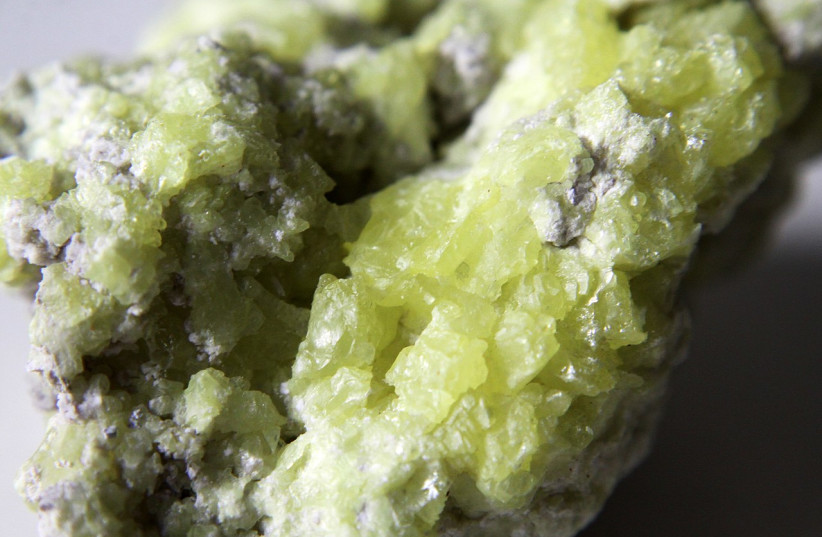Sulfur crisis: Going green will cause severe sulfuric acid shortage - study
Transitioning to a green economy means getting rid of the main source of sulfuric acid while making sure we need more of it than ever.
The world is about to experience a shortage of sulfuric acid, which spells trouble for an industrial society heavily dependent on the important commodity chemical, according to a new study.
The findings of this study, published in the peer-reviewed academic periodical The Geographical Journal, show how the demand for sulfuric acid will skyrocket in the coming years due to a decrease in fossil fuels and the shift to a green economy - and the world isn't ready to handle it.
What is sulfur and sulfuric acid?
Sulfur is an important element with a reputation for smelling like rotten eggs. However, it has a wide variety of uses in various compounds.
A stone of sulfur. (credit: Wikimedia Commons)
In its form of sulfuric acid, it plays a major role in our industrial society, being commonly used in a wide range of products throughout different industries.
Sulfuric acid itself is highly corrosive and dangerous, but cannot exist in its pure form on Earth.
The various uses for it include making fertilizer, antifreeze, batteries, removing rust, and so much more. It is also necessary for extracting rare metals from ores like cobalt and nickel.
In fact, over 246 million tons of sulfuric acid are used worldwide every year.
However, the rise of green technology and more environmentally friendly practices now poses a serious problem. Sulfuric acid demand is going to rise, and our supply is going to dwindle.
So what will cause a sulfuric acid shortage?
The problem is where sulfuric acid comes from.
While there is, in theory, an almost limitless amount of sulfur in the Earth, very little of it can be used for industrial purposes.
Specifically, 80% of the world's sulfur that sees industrial use is derived from fossil fuels, mostly from oil and natural gas.
Sulfur and its compounds are usually removed from fossil fuels during the refining process. This is for a number of reasons, the chief of which is reducing the combustion of the highly polluting sulfur dioxide.
This isn't new – sulfur has been derived from fossil fuels for decades. Fears of a sulfur shortage cropped up in the 1950s, but this was resolved by using the sulfur removed from fossil fuels in the refining process.
Ever since then, sulfur has been in abundance. Its production is basically subsidized by the refining companies, who really want to get rid of it since they see it as hazardous waste, and it is done efficiently. The element's prices have stayed low for decades as a result. Even when the price spiked drastically as a result of the recession, it was still relatively cheap when adjusted for inflation.
But despite this, the shift to a green economy will make this a serious problem and cause a sulfuric acid shortage. This is for two reasons.
First, the shift towards a green economy essentially means the shift away from fossil fuels. This means moving away from the primary source of sulfuric acid.
Secondly, the shift to a green economy requires the use of certain rare metals like cobalt. And in order to get it, you need sulfuric acid to extract it from the ore.
So transitioning to a green economy means getting rid of the main source of sulfuric acid while making sure we need more of it than ever.
This is a major crisis that, due to sulfur's perceived abundance, has gone largely unnoticed thus far.
How bad will this shortage be?
The researchers used several models to calculate just how bad the sulfur shortage would be, deriving from historic and forecasted sulfuric acid demand and calculating growth rates.
The study concluded that by 2040, the world will have a shortage of 100 million to 320 m. tons of sulfuric acid annually.
When this happens, sulfuric acid prices will likely skyrocket, which will have numerous consequences.
For starters, the limited amount of the mineral acid means different sectors will compete to secure it.
And if the technology sector were to outbid the fertilizer sector, that could lead to a major food shortage due to a lack of fertilizer.
Another potential problem is that without this ready-made supply of sulfuric acid, industries will have to resort to other sources. Specifically, it will lead to an increase in directly trying to mine sulfur.
Not only is this less efficient and far more expensive, but it would result in a severe amount of environmental damage.
How can we stop the sulfur crisis?
The study posits a few possible solutions.
First, efforts should be made for industries that use sulfuric acid to find substitutes. For example, fertilizers can use recycled sewage and other wastes. So sewage treatment plants can produce phosphate needed for fertilizers.
Recycling lithium batteries can also make somewhat of an impact, but not much. However, trying to use other batteries that require less sulfur is a good step. Even more so is the development of batteries that are less reliant on rare-earth elements.
This can also be extended further to finding ways to recycle sulfur.
In addition, if we have to use sulfuric acid, then we need to find a way to extract large amounts of sulfur from the Earth in a way that minimizes its cost and environmental devastation.
In addition, if we have to use sulfuric acid, then we need to find a way to extract large amounts of sulfur from the Earth in a way that minimizes its cost and environmental devastation.
Researchers warn of the necessity to develop policies and innovation for the sake of the future by recognizing the impending sulfur crisis and trying to stop it.
HTTPS://DISQUS.COM/HOME/FORUM/THESPUTNIKSORBIT-BLOGSPOT-COM/



No comments:
Post a Comment
Stick to the subject, NO religion, or Party politics